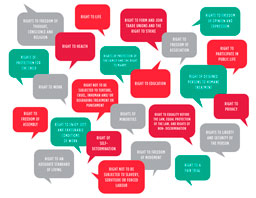3.3 Balancing rights
Within the ideas of rights and fundamental freedoms is also the idea of responsibilities. It is the responsibility of all a state’s citizens to recognise the rights of others. This leads to the question, if everyone has a number of recognised rights, does this mean that everyone is entitled to enforce those rights? You will explore this in Activity 2.
Activity 2 Balancing rights
Within the ECHR are the right to respect for family life (Article 8) and the right to freedom from inhuman or degrading treatment (Article 3). Take a few moments to think about these. What impact do you think these have for the rights of parents who wish to discipline their children?
Comment
Both the Scottish and European courts have considered the issues of balance between the right to respect for private and family life and the right to freedom from inhuman or degrading punishment. This involved balancing the rights of parents to discipline their children with the rights of the children not to have inhuman or degrading treatment inflicted upon them. The court decisions in a number of cases including A v United Kingdom (1999) 27 EHRR 611 have resulted in limitations being placed on parents.
Following the court hearings and changes in public attitudes, the Scottish government reviewed the position. The Criminal Justice (Scotland) Act 2003 clarified the position on physical punishment making it illegal to punish children by shaking, hitting on the head or using an implement.
Activity 2 demonstrates that there can be conflicts between different individuals’ rights. Other examples include the powers of social workers to intervene in the lives of others against their will, in the interest of individual well-being in some extreme circumstances, for example taking a child into care. This action necessarily compromises one person’s right to a private and family life, and interferes with that right.
The necessity to balance rights in certain circumstances is recognised in the ECHR. It recognises the limited nature of some rights and the need to balance them against the rights and freedoms of others. For example, the right to express views publicly may need to be balanced with another person’s right to a private life. The rights of someone accused of a crime to question witnesses may need to be balanced against the rights of the victim and vulnerable witnesses, such as children. The ECHR also recognises that the system of respecting rights works best when there is a recognition that rights and responsibilities go together. If individuals recognise this and act responsibly towards others and the wider community, then a system of rights can work effectively.

